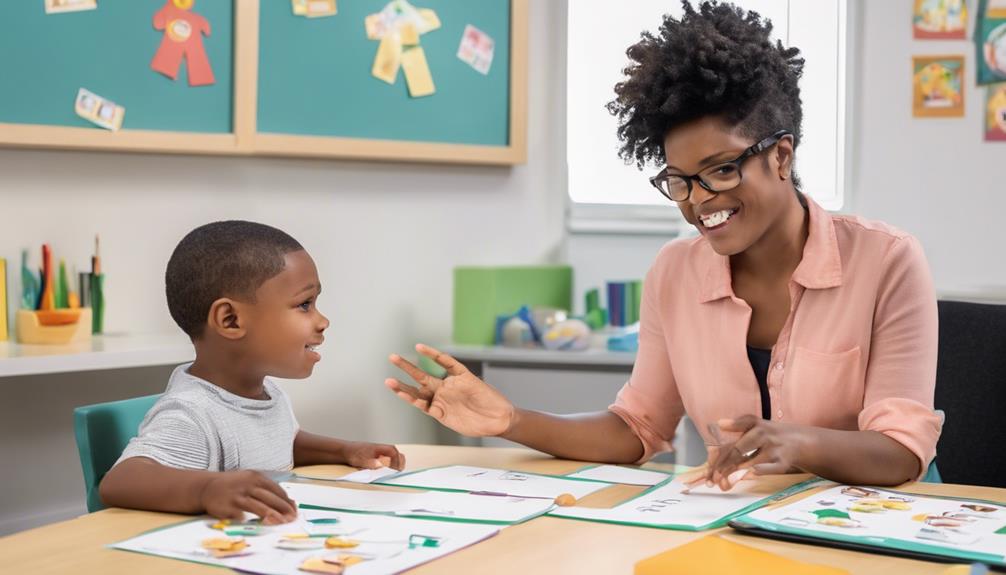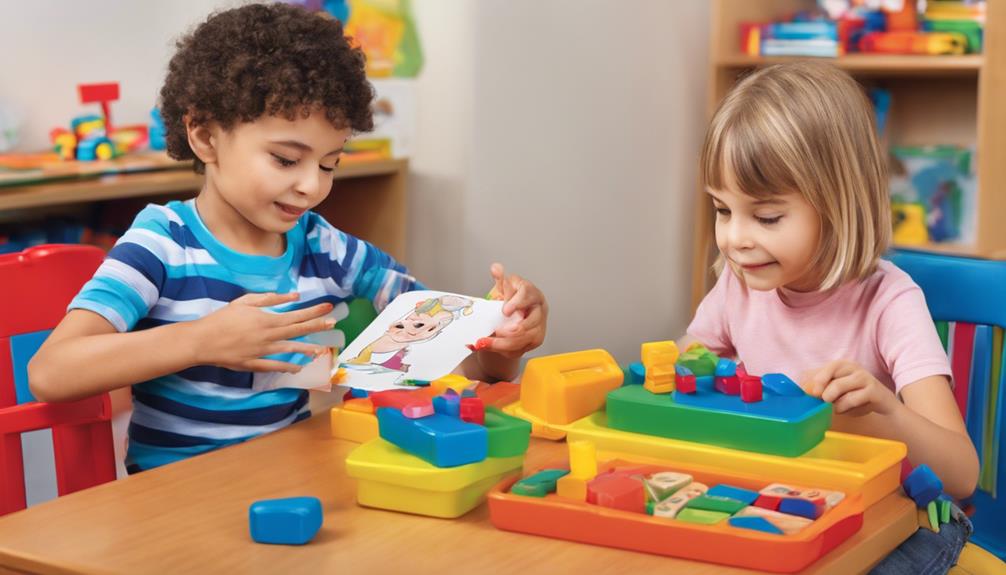In our journey through speech therapy sessions,
we've found that delving into the realm of 'why' questions can open doors to enriching dialogues and deeper connections with our clients.
By posing thought-provoking inquiries that stimulate curiosity and reflection,
we pave the way for meaningful breakthroughs in communication and cognitive development.
It's fascinating to witness the power of these questions as they unravel complexities and unveil new perspectives,
ultimately transforming our therapeutic interactions into profound learning experiences.
Key Takeaways
- Why questions in speech therapy enhance critical thinking and deepen conversations.
- Purposeful construction of why questions aids in client engagement and language processing.
- Interactive activities with why questions foster understanding and stimulate learning.
- Thoughtful responses to why questions promote language and cognitive development effectively.
Importance of Why Questions in Therapy
Why questions are essential in speech therapy for developing conversation skills in children. These questions not only improve language abilities but also enhance social interactions. By encouraging children to understand and answer why questions, we lay the groundwork for academic success and improved assessment performance. Why questions help children gather information about themselves and the world, fostering critical thinking skills. It's remarkable how even 3-year-olds benefit from why questions, with adaptations available for challenges like autism or speech delays. Mastering WH questions is a crucial step before advancing to more complex language skills, making why questions pivotal in speech therapy.
Benefits of Using Why Questions

Using 'why' questions in speech therapy sessions can significantly benefit individuals in multiple ways:
- Enhancing critical thinking skills
- Stimulating deeper conversations
- Encouraging reflection on actions or events
These questions prompt individuals to elaborate on their thoughts, fostering better communication and social skills. By exploring the 'why' behind behaviors or decisions, clients can gain a better understanding of themselves and the world around them.
Importance of "why
Understanding the benefits of incorporating 'why' questions into speech therapy sessions can significantly enhance a child's communication skills and cognitive development. Encouraging students to practice answering why questions during therapy sessions is crucial for their progress. By engaging in these questions, students not only improve their ability to express themselves but also gain valuable insights into their thoughts and feelings.
Through targeted therapy activities like using flashcards and videos, children can actively participate in learning how to respond to 'why' questions, fostering a deeper understanding of language and social interactions. This practice is especially beneficial for children with Autism or speech delays, as mastering 'why' questions from a young age sets a strong foundation for their communication skills and overall development.
Enhancing Critical Thinking
Transitioning from the importance of 'why' questions in speech therapy sessions, we can now explore how incorporating these questions enhances critical thinking skills in students. Answering 'why' questions encourages students to delve deeper into their responses, analyzing cause-and-effect relationships and honing logical reasoning. This process leads to improved problem-solving abilities and the development of coherent, logical thought processes. By exploring the reasons behind actions or events, children learn to express themselves more effectively. Below is a table highlighting the benefits of using 'why' questions in speech therapy for enhancing critical thinking skills:
| Benefits | Description |
|---|---|
| Analyzing Cause-and-Effect | Encourages understanding of relationships between actions and outcomes |
| Improving Logical Reasoning | Develops the ability to think critically and make reasoned decisions |
| Enhancing Problem-Solving | Promotes the skills needed to solve complex issues |
| Coherent Expression | Helps in expressing thoughts in a structured and logical manner |
| Fostering Curiosity | Stimulates a desire to seek knowledge and promotes lifelong learning |
Stimulating Deeper Conversations
In speech therapy sessions, we find that incorporating why questions ignites meaningful conversations that deepen understanding and enhance critical thinking skills. By delving into the reasons behind actions and behaviors, why questions help children grasp the underlying motivations, leading to enhanced comprehension.
These questions also prompt children to articulate their thoughts and feelings more effectively, fostering deeper conversations and encouraging the exploration of different perspectives. Through the curiosity sparked by why questions, children develop a better understanding of cause-and-effect relationships, promoting critical thinking skills.
Ultimately, integrating why questions into speech therapy sessions not only improves language development and reasoning abilities but also enhances overall communication skills by encouraging deeper conversations that stimulate cognitive growth.
Developing Critical Thinking Skills

Regularly engaging in why questions during speech therapy sessions facilitates the development of critical thinking skills by prompting individuals to analyze and explain the underlying reasons behind actions or events. This practice not only enhances reasoning abilities but also fosters cognitive growth through active exploration of causality and logic.
- Encourages Deeper Understanding: Why questions push individuals to delve beneath the surface, encouraging them to seek deeper understanding and rationale.
- Promotes Cognitive Growth: By engaging in why questions, individuals exercise their problem-solving abilities, thereby promoting cognitive growth and enhancing critical thinking skills.
- Fosters Logical Thinking: Exploring the 'why' behind scenarios helps individuals connect causes and effects, fostering logical thinking and decision-making skills.
- Enhances Analytical Skills: Why questions challenge individuals to consider multiple perspectives, leading to enhanced analytical skills and broader comprehension.
Through the consistent practice of why questions in speech therapy sessions, individuals can improve their ability to make informed judgments and articulate coherent explanations, ultimately enhancing their critical thinking skills and cognitive development.
Enhancing Language Expression
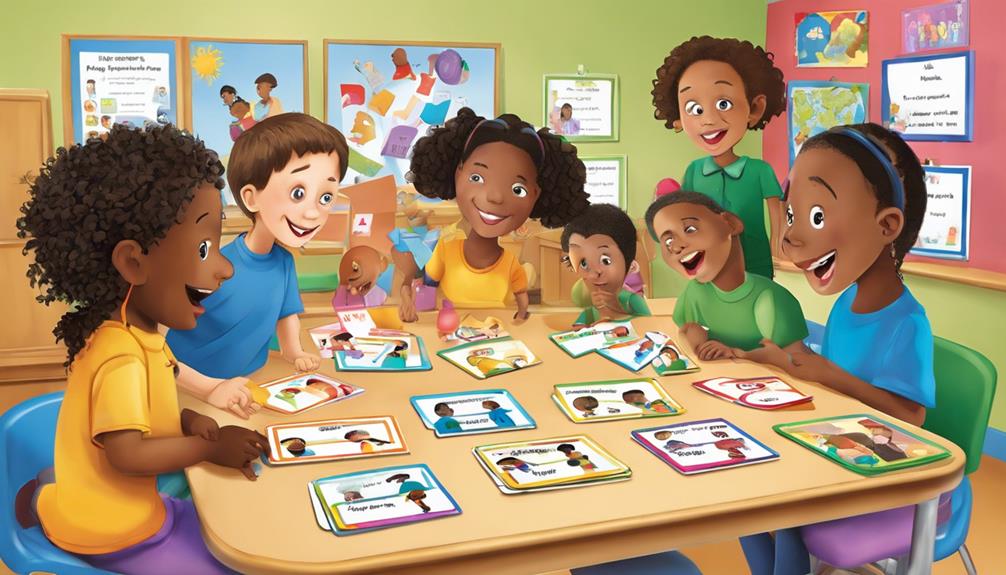
Exploring why questions in speech therapy sessions not only enhances critical thinking skills but also significantly boosts language expression abilities by encouraging individuals to provide detailed explanations and reasons for their thoughts and actions.
Engaging in why questions is a powerful tool to help children develop their expressive language skills. By delving into the reasons behind their choices and behaviors, individuals can articulate their thoughts, emotions, and rationale more effectively. This practice not only strengthens communication skills but also nurtures a deeper understanding of one's environment and interactions.
Through the analysis of cause-and-effect relationships in various scenarios, speech therapy students can practice critical thinking and enhance their ability to express themselves clearly and cohesively. Incorporating why questions into therapy sessions empowers children to communicate their perspectives, fostering a sense of confidence in their ability to convey ideas and reasoning.
The practice of why questions is instrumental in nurturing expressive language skills and promoting effective communication.
Strategies for Crafting Effective Why Questions

Crafting effective why questions involves honing in on the motivations and reasons behind actions or decisions, which can be crucial in speech therapy sessions.
By ensuring that our why questions are tailored to target the individual's engagement, we can create opportunities for meaningful interactions and deeper understanding.
Strategically constructing purposeful why questions can foster critical thinking skills and encourage clients to explore their thoughts and feelings in a constructive manner.
Purposeful Question Construction
In constructing purposeful why questions for speech therapy sessions, it's crucial to engage students with prompts that encourage critical thinking and reasoning skills. By crafting questions that require explanations and justifications, we can prompt deeper language processing and enhance comprehension.
To ensure engagement and meaningful discussions, incorporate contextually relevant why questions tailored to the individual's interests and experiences. Utilize visual aids, real-life scenarios, and personal anecdotes to make the why questions more relatable and engaging. This approach not only fosters improved reasoning skills but also enhances motivation and participation in speech therapy sessions.
- Encourage critical thinking and reasoning skills
- Prompt deeper language processing
- Tailor questions to individual interests and experiences
- Utilize visual aids and real-life scenarios
Targeting Client Engagement
To enhance client engagement in speech therapy sessions, we focus on developing impactful why questions that stimulate critical thinking and reflection, fostering a dynamic learning environment. Incorporating activities, visual support, and personalized relevance in Questions in Speech is key to keeping clients engaged. Utilizing real-life scenarios or hands-on activities can help clients connect with the material on a deeper level, promoting active participation and understanding. Varying the complexity of the questions ensures that sessions remain stimulating and challenging. By crafting why questions that encourage clients to think critically and reflect on their learning, we can create a more interactive and enriching experience that benefits their speech therapy journey.
| Activities | Visual Support | Client Engagement |
|---|---|---|
| Hands-on tasks | Real-life images | Personalized cues |
| Interactive games | Diagrams | Varied question depth |
| Role-playing | Charts | Engaging scenarios |
Incorporating Why Questions in Sessions
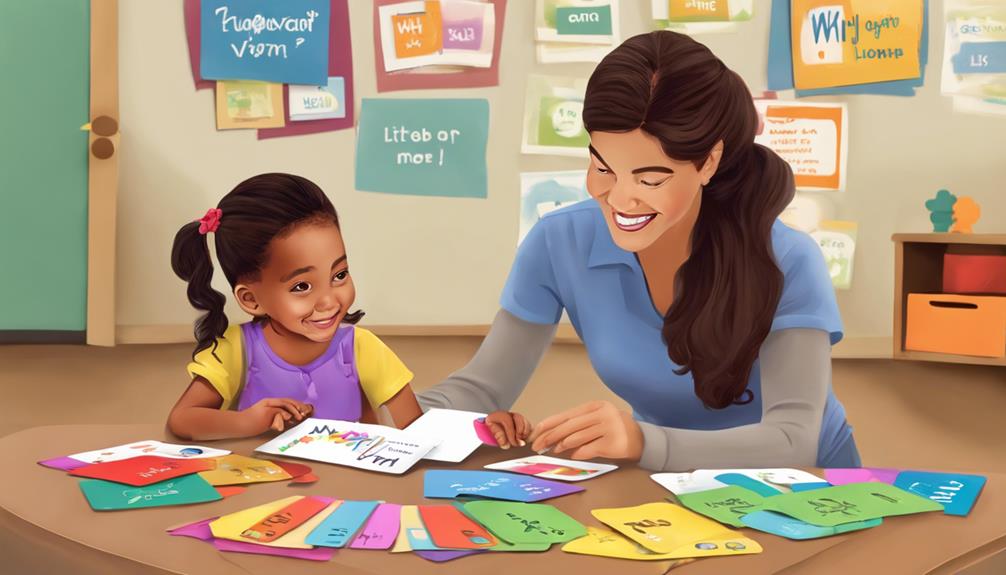
Incorporating why questions into speech therapy sessions facilitates a deeper understanding of language and communication skills for children. Why questions help children grasp reasons, causes, and motivations behind actions and events. They encourage critical thinking, problem-solving skills, and deeper comprehension.
Here are some key points to consider when incorporating why questions in sessions:
- Encourages critical thinking and problem-solving skills.
- Enhances language development and communication abilities.
- Expands vocabulary and promotes effective self-expression.
- Leads to meaningful conversations, improved social interactions, and overall better language skills.
Interactive Why Question Activities

Let's explore fun why question games and creative why scenarios that can make speech therapy sessions engaging and effective.
These interactive activities not only foster critical thinking but also help students understand the reasons behind various situations.
Fun Why Question Games
Engaging in Fun Why Question Games during speech therapy sessions can enhance learning and interaction for students. Incorporating these interactive activities into therapy sessions can make practicing why questions more enjoyable and effective.
Here are some key points to consider:
- Fun games create a positive and engaging atmosphere for learning.
- They help students practice critical thinking skills in a playful manner.
- Interactive activities encourage active participation and retention of information.
- Using game-based platforms or digital task cards can offer a dynamic way to target why question skills.
Creative Why Scenarios
Transitioning from Fun Why Question Games to Creative Why Scenarios, we explore interactive activities that stimulate critical thinking and engagement in speech therapy sessions.
By creating scenarios such as 'Why did the character choose to climb the tree?' we can prompt insightful why questions. Using real-life situations or story elements helps generate engaging questions like 'Why do you think the main character felt sad?'
This approach encourages clients to think deeply about cause-and-effect relationships. Incorporating visual aids or props enhances understanding and participation in these creative why scenarios.
Enhancing Communication Through Why Questions
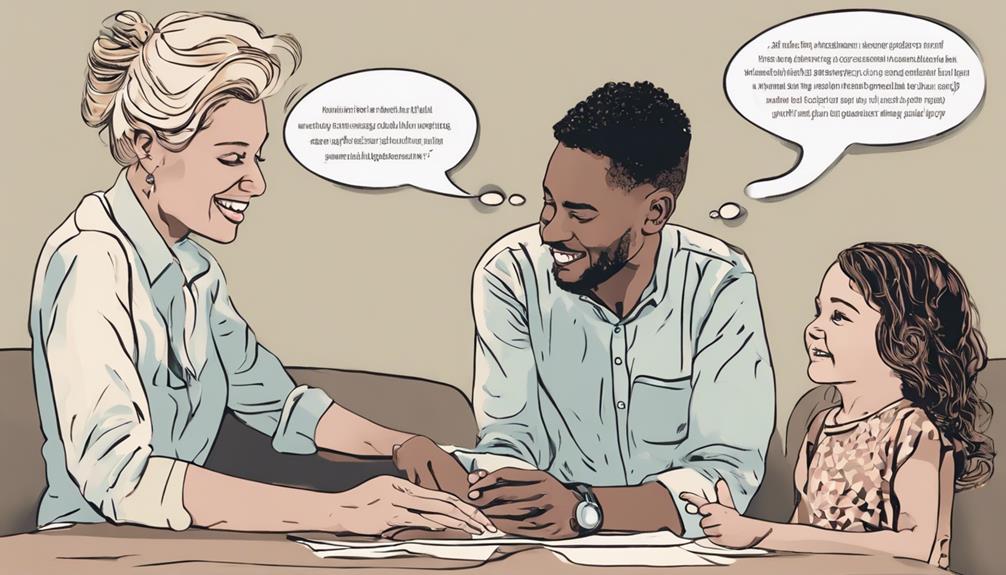
Enhancing communication skills through the use of why questions is a powerful tool in speech therapy sessions. Why questions play a crucial role in promoting communication, critical thinking, and language development among children. Here are four key ways in which why questions can enhance communication in speech therapy:
- Encouraging Reflection: Why questions encourage children to reflect on their thoughts, actions, and emotions, fostering self-awareness and introspection.
- Building Vocabulary: By answering why questions, children expand their vocabulary and learn to express their ideas more effectively.
- Improving Social Skills: Engaging in why questions promotes better social interactions as children learn to communicate their needs, thoughts, and feelings more clearly.
- Enhancing Problem-Solving Skills: Answering why questions helps children analyze situations, identify solutions, and develop problem-solving skills essential for effective communication.
Customizing Why Questions for Clients

When customizing why questions for clients in speech therapy, we carefully consider their age, language proficiency, and specific communication goals to tailor our approach effectively. By personalizing why questions, we can address individual needs and target areas of difficulty more precisely during therapy sessions. Adapting the complexity and content of these questions based on client feedback and progress is crucial for achieving positive outcomes in speech therapy. Client-specific why questions not only enhance engagement and motivation but also lead to more meaningful interactions and language development.
In speech therapy, customizing why questions allows us to create a client-centered approach that focuses on the unique needs and abilities of each individual. This tailored approach ensures that the questions are both challenging and achievable for the client, promoting growth and progress. By adjusting the level of difficulty and relevance of the why questions, we can effectively support our clients in improving their communication skills and reaching their therapy goals.
Creating a Stimulating Therapeutic Environment
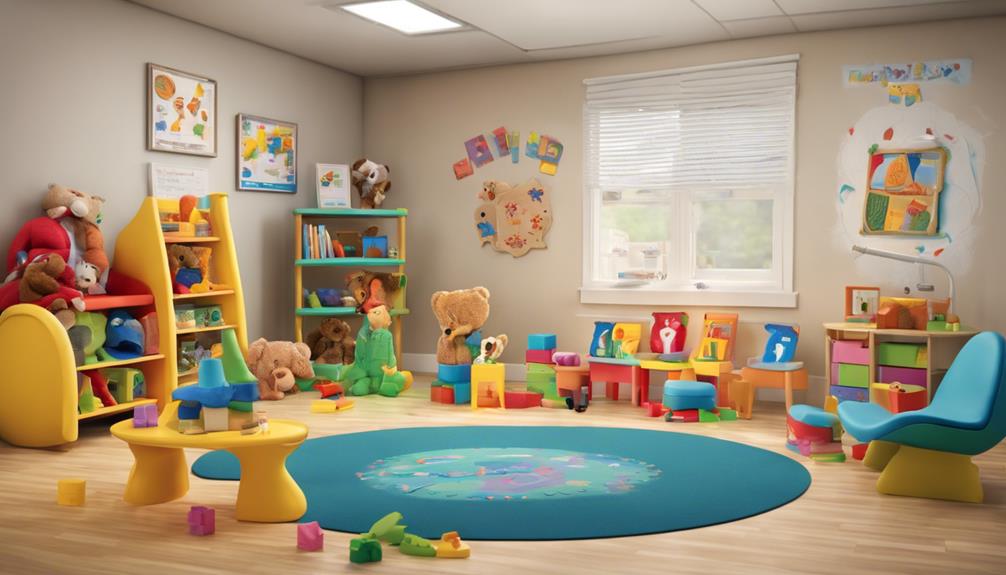
To cultivate a dynamic therapeutic setting for speech therapy sessions focused on exploring why questions, we integrate sensory bins with thematic materials to engage clients in a stimulating learning environment. This approach allows us to create an immersive experience that enhances comprehension and retention of information.
In addition to sensory bins, we incorporate interactive technology, such as Boom cards, to provide engaging and interactive practice opportunities with why questions. Hands-on activities, like sticker books, are also utilized to promote active participation and reinforce key concepts.
Furthermore, collaborating with educators enables us to reinforce the use of visual aids and resources for at-home review and practice of why questions, ensuring continuity of learning beyond the therapy sessions.
- Utilize sensory bins with thematic materials for a multi-sensory therapy activity.
- Incorporate interactive technology like Boom cards for engaging practice sessions.
- Implement hands-on activities such as sticker books to enhance learning and engagement.
- Collaborate with educators to reinforce the use of visual aids for at-home practice.
Encouraging Thoughtful Responses

Encouraging individuals to delve deeper into their thoughts and perspectives through open-ended why questions is a cornerstone of fostering meaningful engagement in speech therapy sessions. By posing open-ended why questions, we aim to prompt critical thinking and promote thoughtful responses from our clients. These questions serve as a gateway to exploring the underlying reasons behind actions and decisions, providing valuable insights into their thought processes.
In speech therapy, utilizing open-ended why questions isn't just about eliciting responses; it's also a powerful tool for enhancing language development. By encouraging individuals to articulate the motivations and causes behind various scenarios, we help them expand their vocabulary, refine sentence structure, and improve overall communication skills.
Moreover, engaging in conversations based on why questions not only supports language development but also fosters better communication skills. Through these interactions, individuals have the opportunity to express their reasoning and opinions, ultimately supporting their cognitive development in a holistic manner.
Promoting Language Development
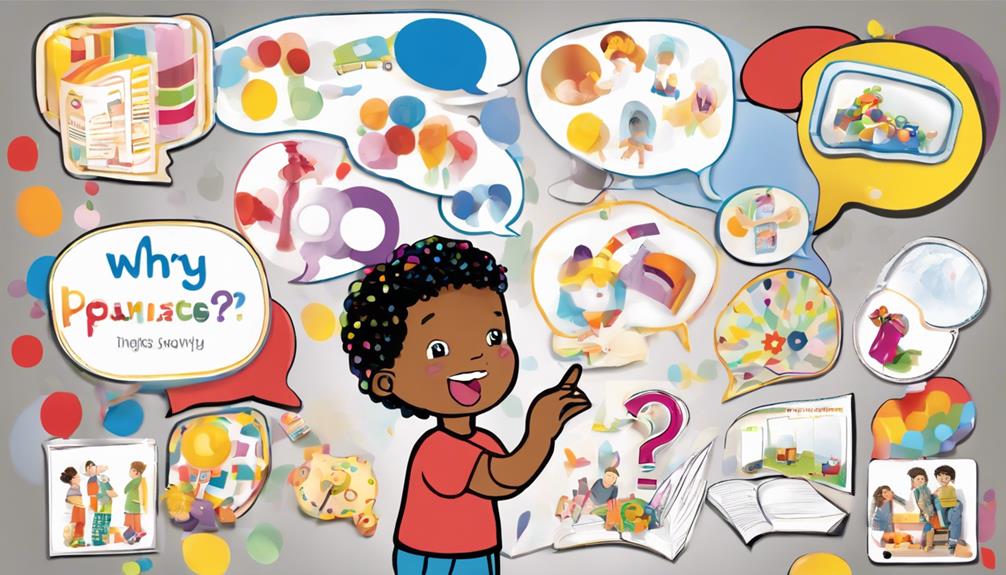
In our speech therapy sessions, we actively promote language development through the strategic use of why questions to stimulate critical thinking and enhance communication skills in children. By delving into the reasons and causes behind actions and events, children can expand their language abilities and understand the world around them more deeply.
- Encouraging Critical Thinking: Why questions in speech therapy prompt children to think analytically and articulate their thoughts effectively.
- Fostering Communication Skills: Engaging in why questions helps children express themselves clearly and make meaningful connections with others.
- Enhancing Language Abilities: By exploring the underlying reasons for various situations, children can expand their vocabulary and improve their language fluency.
- Promoting Curiosity and Knowledge: Why questions support children in exploring new concepts, fostering curiosity, and expanding their knowledge base.
Incorporating why questions into our sessions not only aids in language development but also nurtures reasoning skills, problem-solving abilities, and the capacity to express thoughts cohesively.
Frequently Asked Questions
How Do You Answer Why Questions in Speech Therapy?
We answer why questions in speech therapy by encouraging children to provide explanations and reasons.
We practice using causal conjunctions like because, so, or since.
We help children understand cause-and-effect relationships and utilize visual aids or real-life scenarios.
We support language development by focusing on reasoning and critical thinking skills.
This approach fosters effective communication and enhances cognitive abilities in children during speech therapy sessions.
WHat Is an Example of a WH Type Question?
When we talk about WH questions like 'what,' 'who,' 'where,' 'when,' 'why,' and 'how,' we're diving into the realm of seeking information and understanding. They prompt us to explore reasons, gather details, and explain concepts.
For example, a WH type question could be 'What do you like about school?' These questions are vital for language development, critical thinking, and fostering expressive communication skills.
How Can I Make Speech Therapy More Fun?
We can make speech therapy more fun by incorporating interactive games, colorful visuals, and hands-on materials that cater to the child's interests.
Using technology like interactive apps and online games can add a dynamic element to the sessions.
Encouraging role-playing and storytelling with why questions promotes creativity and active participation.
Implementing positive reinforcement strategies helps motivate children during therapy.
How Do You Engage Students in Speech Therapy?
We engage students in speech therapy by using hands-on activities, technology, interactive stories, group interactions, and visual aids. These methods help capture students' interest, promote critical thinking, enhance communication, and make learning practical and fun.
Our approach focuses on creating an interactive and engaging environment that encourages active participation and fosters growth in speech therapy sessions.
Conclusion
As we wrap up our session, it's clear that asking 'why' questions has been instrumental in promoting language development and critical thinking skills. Who'd have thought that such a simple word could have such a powerful impact?
Keep questioning, keep exploring, and keep growing. Remember, the answer to 'why' may just lead you to unexpected discoveries and endless possibilities.
Let's continue on this journey of curiosity and learning together.



